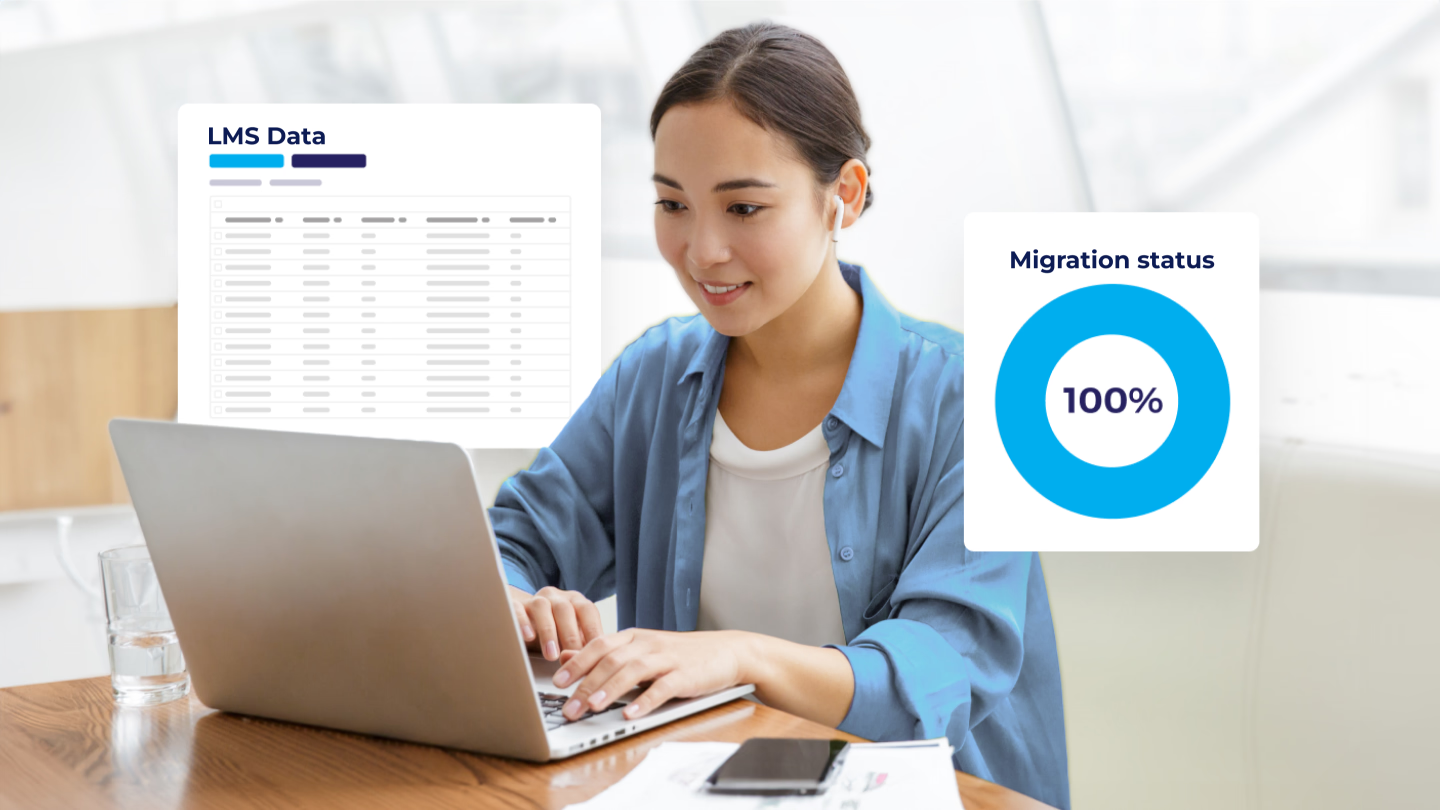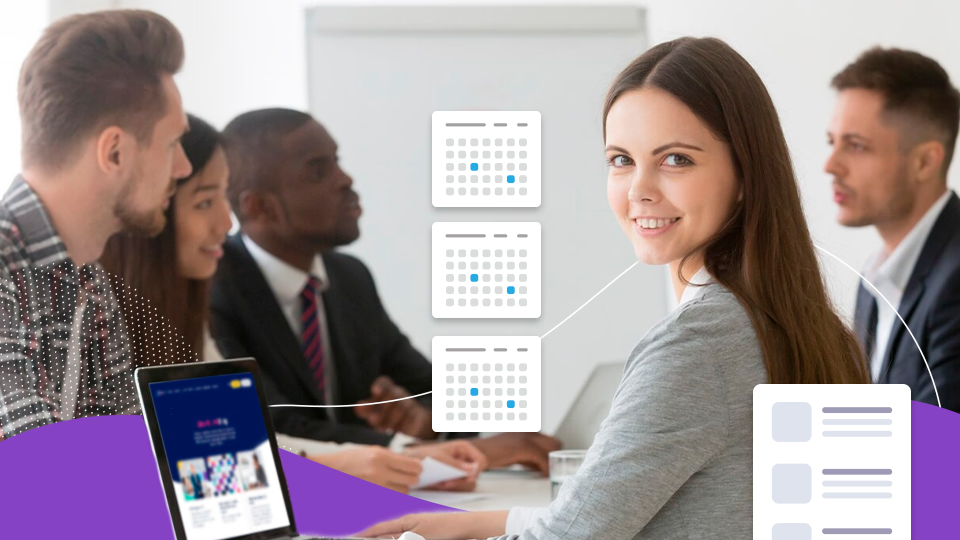What is LMS migration and why is it important?
Is your training program ready for the future? As companies strive to stay ahead of the curve, many are reevaluating their learning management systems (LMS). This is to ensure they can support modern training initiatives and develop a skilled and engaged workforce. However, the thought of migrating to a new LMS can be daunting. Convincing stakeholders of the value proposition and navigating concerns during the switch are significant hurdles.
The good news is that a well-planned LMS migration can be a transformative experience, not a disruptive one. Organizations can ensure a smooth transition by addressing data security concerns upfront and establishing a clear communication plan to minimize downtime. This guide will equip you with the knowledge and strategies to navigate an LMS migration successfully, addressing common concerns and ensuring a positive outcome for your training program.
What are the reasons for considering an LMS migration?
Reasons for considering an LMS migration include outdated technology, lack of scalability, poor user experience, inadequate support, and the need for better integration with existing systems. Upgrading to a new LMS can enhance learning outcomes, streamline processes, and align with developing educational needs.
In fact, according to a recent study by Brandon Hall:
17% of companies don’t have an LMS
27% are unhappy with their current LMS
46% of companies who have an LMS have one that is not suited for extended enterprise
50% of companies with an LMS experience integration issues
54% of companies with an LMS are missing the key functionality they need
Assessing your current LMS and learning strategy
Before diving into the technical aspects, assessing your current LMS and learning strategy is vital. This step goes beyond technical considerations and encourages organizations to reflect on the broader narrative driving their decision to migrate.
Understanding the "why" behind migration
Every LMS migration has a unique story behind it. Organizations embark on this journey for a variety of reasons, and it's crucial to understand the driving forces. Is it a shift in your learning strategy that necessitates a more agile and adaptable LMS? Are you looking to address the challenges of your current system, such as limited reporting capabilities or lackluster user experience?
Adapting to changing learning strategies
Learning strategies are not static in education and training. As your organization grows and evolves, your learning approach will need to adapt to incorporate new methods such as gamification and social learning, as well as mobile learning. Perhaps you're moving from a traditional classroom-based model to a blended learning environment, or you're embracing microlearning to meet the needs of today's learners. Your LMS should align seamlessly with these strategic shifts by leveraging social media to enhance learning experiences.
Measuring returns on learning investments
If you want to future-proof your training program, it's vital to stay ahead of the curve. That's why many companies are reevaluating their LMS to ensure they can support modern training initiatives and develop a skilled and engaged workforce.
Craft data-driven learning experiences: Gain insights into learner engagement, knowledge retention, and overall program effectiveness. This allows you to measure returns on learning investments (ROI) and demonstrate the true value of your training programs.
Identify knowledge gaps and tailor training: Advanced analytics help you pinpoint areas where employees might need additional support and personalize learning paths accordingly.
Measure the impact of your training programs: Track key metrics like skill development, performance improvement, and ROI to demonstrate the true value of your training investment.
By leveraging these capabilities, you can transform your training program into a strategic driver of growth and innovation.
If you want to maximize your return on learning investments, modern LMS solutions offer advanced analytics capabilities that can help you optimize your training programs and ensure they deliver measurable results. Explore the possibilities of data-driven learning with advanced LMS solutions.
Your LMS and you: Thriving or surviving?
Explore seven key questions to ask to ensure your LMS is driving the results you need. By taking a proactive approach, you can determine if an LMS migration is the right step to keep your L&D program on the cutting edge.
Packaging technical aspects within the larger story of strategy
It's essential to frame the technical aspects of LMS migration within the broader context of your organization's goals and vision. When presenting your migration plan to key stakeholders, emphasize how the chosen technical solutions directly support your emerging learning strategy and meet the specific LMS requirements. Highlight the potential for improved learning outcomes, enhanced user experiences, and more efficient content delivery. This includes gathering information from all stakeholders who understand the existing LMS well, such as subject matter experts, the L&D head from the HR team, instructional designers, LMS administrators, and the IT team. Training the admins, end-users, and other key stakeholders is also important in the LMS migration process. The performance of an LMS is enhanced and improved if the users are following the best practices.
An LMS migration is not solely a technical endeavor; it's a strategy. By intertwining the technical considerations with the larger narrative of why you're migrating, you create a compelling case for change. This approach not only ensures that your technical choices align with your strategic objectives but also fosters a deeper understanding and support for the migration among your team and stakeholders.
A checklist to simplify LMS migration
As you embark on your LMS migration journey, keep in mind that it's not just about the destination—it's about the transformation and growth that can be achieved by aligning your technical choices with your overarching learning strategy. Here are some items to check off for a successful LMS migration:
1. Get a comprehensive overview of your data
If you're switching to a new LMS, a smooth transition can be easy with the right tools and resources. Once you have finally decided to switch to a new LMS, the next step is preparing for the LMS migration process, including planning for LMS data migration. This involves identifying and moving the data from the current system to the new one, which requires understanding the data stored in the current LMS system, including everyday learning events.
2. Make sure you understand your data
A comprehensive data mapping exercise is usually involved in this process, which results in a map from the old system to the new one. You'll want to work with an LMS provider who has a proven process and templates for importing existing data. As you prepare for the legacy LMS migration, determine if you want to import existing user data or if you'd prefer to start fresh with completely new courses and a new learning strategy.
3. Clean up your data
During a migration, you can also remove out-of-date learning content and refresh the library with new courses. If your LMS provider has a learning solutions team, you can tap their course design expertise to leverage multimedia options, simulated content or even virtual reality course experiences. Depending on when you last updated your LMS, this can be an exciting time to make the most of everything that's available for today's learners. Successful data migration sets the foundation for positive user experiences for years to come.
4. Bring in the migration specialists
The LMS migration process can be a daunting task for organizations, but it is necessary to ensure that the new LMS fits their needs. It is important to choose an LMS provider that offers migration services to simplify the expensive process and avoid interference from third parties. Preparation is key for a smooth transition, and organizations should consider factors such as budget, timeline, and user needs before making the switch from their old LMS. To ensure a successful migration, it is crucial to document migration specifications at an early stage. Following a step-by-step approach can also help make the migration process easier and less complex.
5. Plan your implementation
Implementation is when your strategy and planning come together, so you want to ensure you're as prepared as possible. Along with the right tools and resources, an implementation support team that specializes in everything related to LMS migration, such as the migration team, can help make the transition as smooth as possible. You may have an in-house team supporting your LMS, but also look for a provider who offers a team of implementation specialists. They can work together with your team to evaluate data import and export, application programming interface (API) integration, documentation, and other needs. Knowledgeable specialists from the migration team will help facilitate the LMS migration so that you can start experiencing the power of productivity as soon as your new system goes live.
6. Integrate your LMS with the tools you already use
Most modern LMS platforms provide integrations with your HCM and CRM systems. But if you've been using social platforms, videoconferencing or curated content from third-party libraries , make sure your new LMS can integrate with the tools you're already using, including apps. If these libraries are essential to your learning strategies, confirm early on that your LMS partner will enable you to continue using the technology you need.
Changing to a new LMS is a big decision. Absorb may be the right partner for you. Absorb is committed to making the transition as smooth as possible for everyone involved: learners, the human resources and training and development teams, IT, and even executive sponsors. The right partner will handle the details and provide specialists who are ready to transform your LMS experience from good to great.
Navigating the LMS migration journey
In L&D, the ability to adapt and transform is the cornerstone of success. We've embarked on a comprehensive journey, guiding you through the intricacies of LMS migration, with a particular focus on the strategic aspects that go beyond the technical details.
Measuring returns on learning investments is another common catalyst for LMS migration. If you find that your current LMS vendor is not delivering the desired outcomes or if your learning programs are failing to engage and educate effectively, it's time to reevaluate your strategy and consider a new LMS provider.
A successful LMS migration goes beyond simply implementing a new technology. When you're ready to improve your learner experience and take advantage of new features and functionalities that can enhance your learning and training programs, partner with a team that doesn't just see it as a technical process.
Look for an LMS provider that fosters a deeper understanding of your learning strategy. This collaborative approach ensures the new LMS aligns seamlessly with your overall training goals. The ideal partner will also provide support throughout the implementation process, guiding your team and stakeholders through the transition.
A smooth migration is key to maximizing the benefits of your new LMS. Make sure your chosen provider has a proven process and templates for importing existing data. Experienced implementation specialists can facilitate platform migration, minimizing downtime and ensuring a swift transition.
Your LMS migration is an opportunity to transform your entire learning ecosystem. Revamp your approach, enhance content delivery, and align your learning strategy with your ongoing needs. By partnering with the right team, you can leverage this migration to deliver impactful outcomes that support your organization's wider business goals and drive lasting success.
Embracing the future of learning
Your LMS migration is an opportunity to revamp your educational approach, enhance your content delivery, and align your learning strategy with your evolving needs. It's a chance to make a significant impact on your organization's growth and success.
If you’re ready to start your LMS migration, Absorb is ready to be your partner on this journey. Your success is our mission, and together, we can make your learning vision a reality.
Get started today to take the first step toward a brighter, more engaging, and more effective learning experience for your entire organization.








